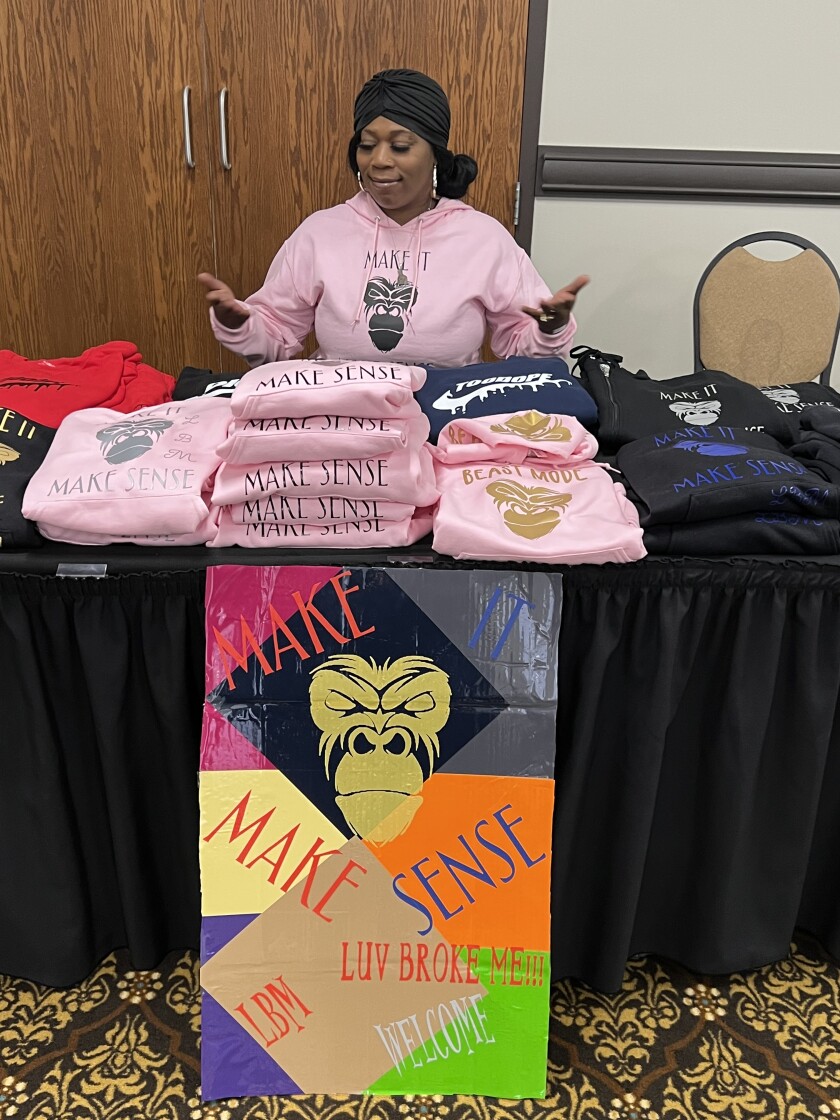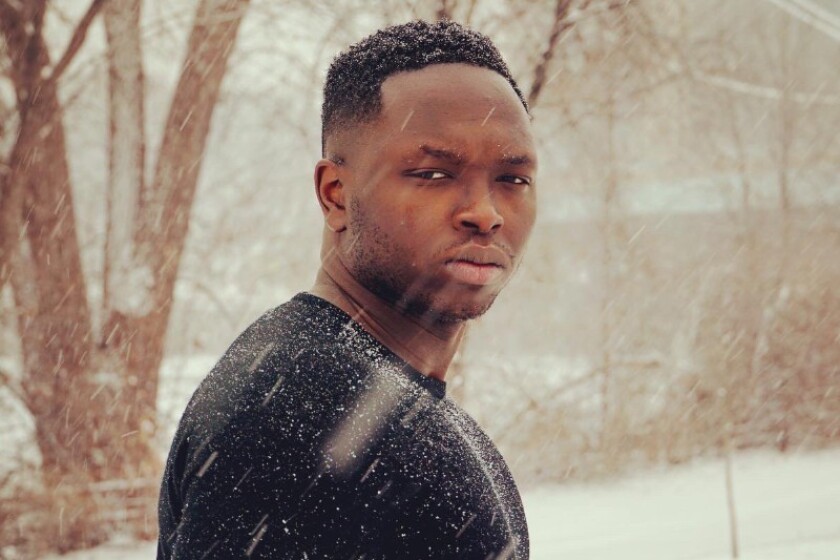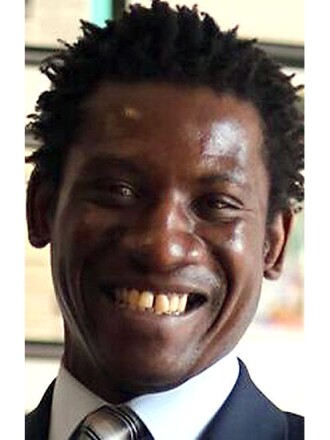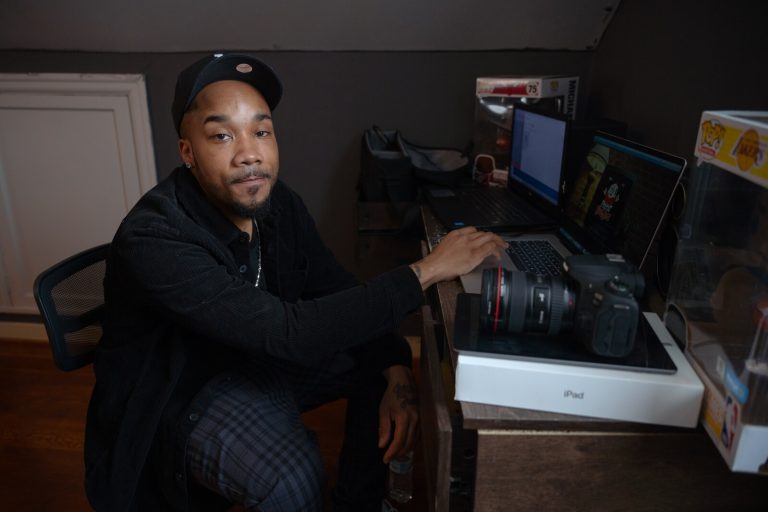ROCHESTER — There’s movement under the surface of Rochester’s local business scene — but for those outside of the Black community, it can be hard to see.
Ryan Arnold, a one-man videography studio, works well over full time between working his job at Mayo Clinic, completing a cinematography degree at Full Sail University, and trying to break into Rochester’s music video scene.
As the founder and owner of
, Arnold has spent the last four years and change building up a brand from the ground up.
It’s slow going, building a brand in Rochester, he said.
Right now, Arnold is firmly in the “spend money” phase of the traditional “spend money to make money” business wisdom — putting cash into his degree, equipment and software, while keeping his video prices “affordable” so serious musicians will work with him.
Ryan tries to make about $200 per video, he said, but if it’s not, he’ll sacrifice money in order develop his brand.
“It’s not so much a money thing,” he said. “Right now, with what I charge, what I make isn’t minimum wage. … But if I can find some really cool artists with talent, I feel like we can make something happen that will be great later.”
, business ownership among racial/ethnic minorities was on the rise in Minnesota. However, those business-owners were still under-represented compared to the number of adults of color in Minnesota.
Complicating matters, businesses owned by minorities tend to have few employees, less revenue, and fewer opportunities for funding.
Finance: The first barrier
Tawonda Burks, the owner of consulting business ELOCINA
, has seen “some movement, but not a whole lot,” among Black-owned businesses during the pandemic.
“It all goes back to that lack of funding and education,” she said.
Home-based businesses conduct themselves differently from brick-and-mortar stores, Burks said. They often post on social media to find customers – like Yolanda Davis, the owner of
, a local apparel retailer.
“Sometimes I make a lot of business cards, then I go out and place them on people’s windshields, leave them at different events I go to … or wear something that promotes my business,” Davis said.
Davis partnered with a friend to move some of her wares into
, but conducts most of her business from home. Business is slow, she said, and unlikely to pick up without a
.

Contributed / Yolanda Davis
Eventually, Davis would like to own a storefront, but her credit is poor and she needs a loan to take things to the next level.
“I’ve got goals, you know?” she said. “But I’m just doing this one day at a time.”
Most small business owners in Rochester have the same mentality, Burks said, in that the money they make goes toward food, utilities and rent.
Ideally, “what you make with your business is for your business, and we talk about paying yourself at a later date,” she said.
However, finance separates businesses that succeed from ones that fail. People without funding may not be able to sustain their home businesses, let alone move forward, Burks said — after all, how can they operate without paying for inventory?
“Some people can do incredible work, they may even have a license, but they can’t open up an establishment,” she said. “So they sell from the house.”
Burks knows plenty of home-based businesses who do “pretty well,” by which she means they break even on costs. But few can look beyond that without loans for inventory purchases and a storefront rental.
“I do think it’s feasible for them to grow in scale,” Burks said. “However, there are so many barriers for them to reach that spot.”
She added credit repair to her consulting business in June, after seeing clients leave with solid business plans that still couldn’t get approved for loans.
Home-based businesses also have a significant disadvantage in terms of self-promotion.
Rochester-raised entrepreneur Solomon Antoine has developed and marketed two apps since 2018. The first,
was a Task Rabbit-esque platform where users could post and pick up gigs like lawn-mowing or furniture assembly. The second,
directs users to pick-up basketball games.
Of the two, only Hoop Spots survived. Antoine needed two tries to make a program that users really wanted and could use easily — mostly because of his focus on the product, not the business. Favr experienced “a lot of growing pains,” Antoine admitted.
Antoine coded Favr, later renamed Gigwerk, during his senior year of high school. He said he made good use of Rochester’s resources, like the 1 Million Cups meetups and Collider Coworking.

Contributed / Solomon Antoine
But he spent more than a year learning to code for the project, and neglected the business aspect of actually running a startup company. The onset of COVID-19 as Antoine decided to transition Gigwerk into a B2B app didn’t help.
Step one of any successful business is developing a good product, Antoine said. But step two is working with customers to ensure the product is something they use. Step three, he said, is monetization.
“If you’re not reaching out to customers, if you’re not reaching out to potential users, your product’s really not going to work,” Antoine said. “We learned a lot, though. We learned the art of the business side of things — how to get things into a written contract before you start building. We were just building a product that we thought customers would want to use, instead of actually asking those customers if they’d like to use the product.”
If Favr was an attempted home run, Hoop Spots, Antoine’s second app, is “a single.”
After about 18 months, the app has about a thousand users and “a lot of good reception from users.”
As a basketball player himself, Antoine first built the app for himself. Then he passed it to close friend and watched how they used it to find and organize pickup games — a step he’d skipped with Favr.
“That was a good process that I learned from the past,” Antoine said. “You have to figure out what your users want. You can’t always guess right, your intuition might be off. So you actually have to go out and sit down and talk to them.”
Education: Another barrier
Plenty of consultant Burks’
clients stumble during their first startups
, often because they don’t know the ins and outs of insuring and operating a full business.
Burks chalks that up to a lack of mentorship for the Black community, as well as reluctance to start over once an initial attempt has fallen through.
“Every business is not 100 percent successful,” she said. “A lot of them don’t have that guidance and that willpower to get through.”
However, a few Rochester organizations are looking to help.
Burks cofounded the Black Entrepreneurship Team, or BET, with
of Greenhouse Grafix and
of Barbershop and Social Services.
The organization plans to eventually consolidate training, education and funding for Black-owned businesses, but is still “being mapped out.”
The city of Rochester also held an African American Construction Entrepreneur event at the end of January, with representatives from Destination Medical Center, Associated General Contractors of Minnesota, and the Minnesota Office of Equity’s
Small Business Procurement Program
.
, Minneapolis Fed analyzed the differences in businesses owned by white people compared to people of color. One topic of note was the difference in sectors. While firms owned by people of color tended to specialize in transportation and warehousing, retail trade, or health care and social assistance, white-owned firms were usually in construction, finance and insurance, and professional, scientific, and technical services.
The latter three fields tend to have significantly higher earnings.

Kenneth Bush of
, a Rochester-based real estate development company, and the Minnesota Minority Trades Council was a prominent participant in the virtual event. He said it was time for Black contractors to get a piece of the DMC pie.
Bush founded his company in 2008, but only became DBE (Disadvantaged Business Enterprise) certified in the last year, after realizing having a diversity certification could help him secure funding.
He said there’s still plenty of room for Black entrepreneurs to grow in Rochester — and seeing prominent businesses share space with white entrepreneurs is relatively new to him.
Now 47, Bush said he only knew one Black business owner as a child.
“All this stuff is very new to our community,” he said. “You go down Highway 52 and you see Benike Construction. You go to the south side of the highway and you see Bush Companies. One company was founded over 100 years ago. One company was founded 13, going on 14 years ago, but I’ve been in Rochester for over four decades. We finally got caught up, but we may not be at the same income level, or the same knowledge level.”
“If we can continue to have these talks about barriers, we can help get more people into the business,” he added.
Coder Antoine moved to Edina, Minn., where he works as a software engineer at
.
He said he thought Rochester was missing “entrepreneurial infrastructure” a few years ago, but hopes to be part of that influx someday.
“One of my big missions is if I do succeed in one of these startups, I’d love to go back,” he said. “I’d love to organize a scholarship (or) some type of fund that encourages very young entrepreneurs to work on their products.”
Where are Rochester’s Black-owned businesses?
Burks knows there are plenty of Black-owned businesses in Rochester.
It’s just that many of them are unlicensed, home-based and have few options for expansion without help.
Burks, who has lived in Rochester for 24 years, said her top way to find Black-owned businesses is word of mouth.
“It’s a matter of really asking others, ‘Hey, do you know who does hair in the community?’” she said. “‘Do you know any Realtors?’”
Burks is working on a list of Black business owners in Southeast Minnesota – and has been for several years. She has a couple hundred names on the list, including doctors, bakers, beauty technicians and more.
While the average person can Google Rochester’s hair salons, for example, Burks knows “at least a hundred other people here who (do) braids or hair.”
For new transplants to Rochester, it’s crucial to find a local connection, and mine that for goods and services, she added, to “know who’s in the know and where to go.”
Remember that directory of Burke’s? While the business consultant currently uses it to connect customers to producers, she plans to keep working on it and make it into a full-fledged directory. It’s sorely needed in Rochester, as there is no easy way to find Black-owned businesses to support. The Rochester Chamber of Commerce lists three minority-owned businesses in town: Bush Companies, Remodeling D.L., LLC, and Xylo Technologies, Inc. Only Bush Companies is Black-owned.
Administrative assistant Cherie Thurlow said the Rochester chamber had created a new opportunity for members to list themselves as minority-owned, and “hope(s) to be able to have more detailed information available later this year.”
The Rochester Moms Blog released
to Black, Indigenous, People of Color-owned businesses that include organizations with white women at the head, as well as several businesses that closed in between collecting names and publishing the list in December 2021, like
.
The
Minnesota Black-owned Business directory
has no Rochester entries. An Explore Minnesota list of places to support included thriving restaurants Jersey Jo’s and Francisco’s, but led with Brava, which appears to have been closed for years.





